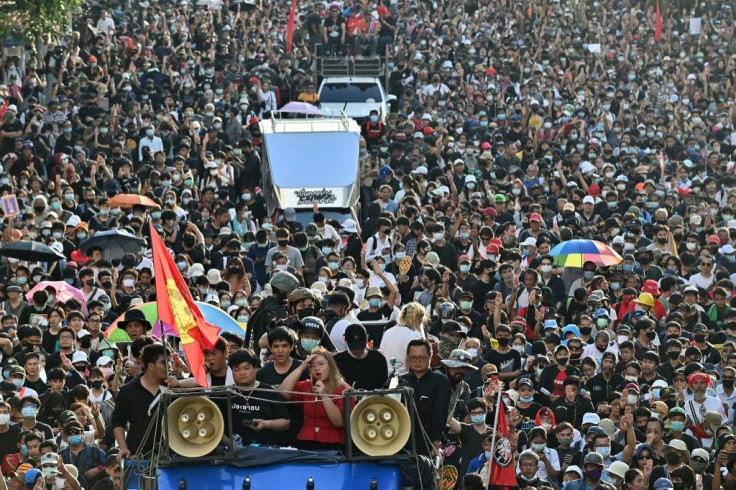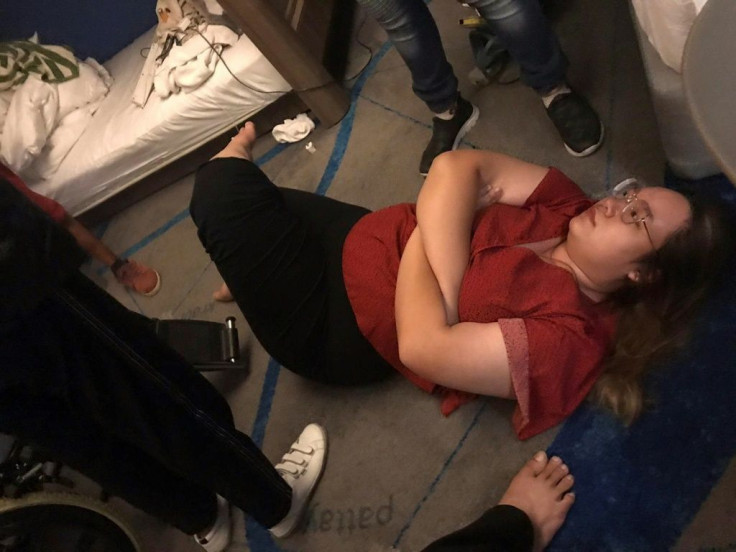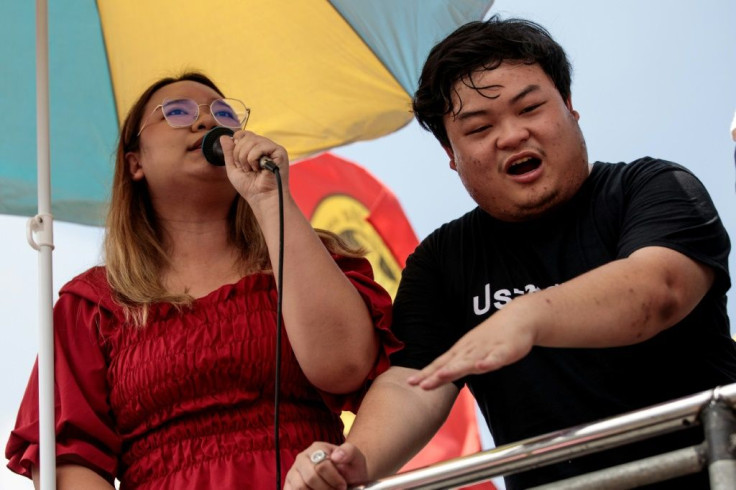'I Had To Do It': The Student Leader Defying Thailand's Royal Taboo
Thai activist Rung jabbed at the establishment when she demanded reform of the all-powerful monarchy last month -- a stand that saw her bundled into a car and arrested on Thursday.
The university student, whose real name is Panusaya Sithijirawattanakul, has become one of the best-known faces of Thailand's swelling pro-democracy movement, now targeted by a forceful government crackdown.
She was the first to read out 10 demands to reform the kingdom's monarchy before thousands of protesters at a rally on August 10, leading the defiance against the country's biggest political taboo.
They included more transparency for the royal family's fortune and the abolition of the royal defamation law, which carries a sentence of up to 15 years in jail per charge.
"When I left the stage, I felt like I had expanded the boundaries... raised the limits on how people can talk about the monarchy," the bespectacled sociology and anthropology student, now 22, told AFP late August.

Calls challenging the previously unassailable royal family have grown louder since, culminating in the unprecedented challenge by some protesters Wednesday who raised three fingers as the motorcade ferrying Queen Suthida and Prince Dipangkorn drove by.
By early Thursday, "serious" emergency measures were imposed in Bangkok to put a stop to what the government described as unconstitutional demonstrations.
As fellow activists were arrested, Rung criticised the emergency measures on a live feed.
"The crackdown is illegitimate, because in a democracy, we should be able to rally," she said.
Hours later, police arrested Rung in her hotel room, with the scene broadcast to tens of thousands of people on Facebook Live.
She is one of 22 detained for Wednesday's protest and a government spokesman has warned legal procedures will be pursued against those who had "acted in a way that defames the monarchy".

Born 1998 in Nonthaburi to a middle-class family running an auto workshop, Rung said she was just 10 years old when she first questioned the reverence with which the country was expected to treat the royals.
Her entire neighbourhood was ushered out onto the streets to pay respects to a royal motorcade.
"I remember thinking: 'Why did I have to go? Why did they have to force me and other people to kneel down?'"
Shielded by draconian defamation laws, the super-rich monarchy wields enormous influence in nearly every sphere of Thai society -- and is buttressed by an arch-royalist military.

Rung said she became "radicalised" as she saw the 2014 coup unfold when she was 15.
"Soldiers don't have the authority to rule the country and everything broadcast then was propaganda," she told AFP.
Partly inspired by the Hong Kong democracy protests, Thai activists are calling for a complete overhaul of the government of Premier Prayut Chan-O-Cha, the former army chief who led the 2014 coup.
The current protesters see Prayut's administration as only serving the elite.
At the apex of power sits King Maha Vajiralongkorn, who has made unprecedented changes to the institution since ascending the throne in 2016.
He has taken personal control of the palace's fortune, worth an estimated $60 billion, and also moved two army units under his direct command.
The burgeoning youth-led movement wants changes "meant to sustain the monarchy in a way that is adapted" to the modern world, said Rung.
"No one should be more important or higher than anyone else."
But speaking out comes at a cost.
At least nine pro-democracy activists who fled Thailand since the 2014 coup have disappeared in the past two years, according to Human Rights Watch.
Even before their latest arrest Thursday, Rung and other student leaders had been hit with multiple charges, including sedition, carrying a maximum sentence of seven years in jail.
Some analysts -- and even student leaders themselves -- have recalled the events of 1976, when students protesting the return of a military dictator were shot, beaten to death and lynched by state forces and royalist mobs.
But Rung continued to travel to rallies outside Bangkok to make speeches and helped organise gatherings in encrypted message groups that attracted thousands.
"I knew that after I read out the 10 demands, my life would change forever," the softly-spoken activist said as she played with her kitten.
"I still had to do it."
© Copyright AFP 2024. All rights reserved.











